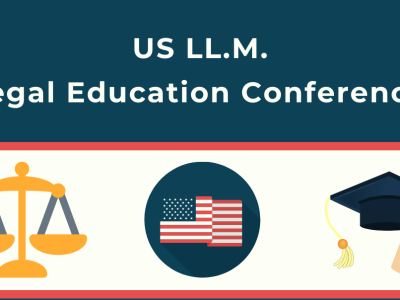It should be a simple question, but unfortunately, it can be hard to get a straight answer. Many law schools say that work experience is ‘preferred’ or ‘optional,’ but don’t offer much guidance beyond that.
But do you really need work experience to apply for an LL.M.? In most cases, no. While work experience does look good on an application, it is often not a necessity and many have successfully obtained LL.M. degrees with no previous work experience.
However, there are a lot of exceptions here: some LL.M. programs actually do require work experience, some don’t but strongly prefer it, while others still seem mostly indifferent.
Here’s everything we know about work experience and the LL.M.
How much work experience does an average LL.M. student have?
Over a dozen US-based law schools consulted for this article estimated that a majority of their incoming students had anywhere from one to five years of work experience prior to starting their LL.M.
Some top-tier universities placed their estimates higher. Georgetown Law noted that around 80 percent of its international students have an average of five years of full-time work experience; additionally, 60 percent of incoming LL.M. students from the U.S. claim an average of seven years of previous full-time work. The numbers were similar among other top universities; Penn Law cited the fact that, in a given year, 75 percent of its LL.M. students have at least some work experience, and within that group, about a third have worked for six or more years.
Almost every US-based school contacted made a point that they will accept students without work experience under specific circumstances. These LL.M. program candidates make up for their lack of work experience by emphasizing what they have achieved in law school or during internships.
For LL.M. programs outside of the United States, work experience requirements appear slightly reduced in some cases. Both Trinity College in Ireland and Stockholm University in Sweden, for example, say that their average incoming student has an average has anywhere from zero to a few years of work experience, though they clarify that they have students with considerably more experience. Cambridge University in the UK makes a comparable claim, saying that one does not need work experience to apply but should be able to demonstrate a history of interest in law, whether through work experience or other means.
How heavily is work experience weighted on an LL.M. application?
It depends, says Polly Lawson, Assistant Dean for Graduate Studies at the University of Virginia School of Law. Instead of thinking solely about work history, students should look at their application as a story of their academic and practical experience, highlighting time spent in skilled positions even if they were not directly connected to work: “If a student is coming directly from their first degree or masters, we will look for extracurricular or internship experience and what leadership qualities the student has demonstrated in his or her experience,” she states.
In some schools, the need and value of previous experience depends on the program.
“For our specialized LL.M. programs in banking and tax and intellectual property, there is definitely more of an emphasis on work experience than within the American Law program, which can be done without work experience,” notes Boston University’s then-Associate Director of Outreach Matthew Jennings.
Still, he reminds prospective students that “in many cases, work experience can be substituted… If someone in their undergraduate studies has taken courses that demonstrate to us the same [experience] and potentially has done internships in those areas, that will also be looked upon favorably in the admission process.”
Other schools put a more substantial weight on work undertaken outside of a school environment. Columbia Law School’s FAQ page notes that, for the school’s full-time LL.M. program, while candidates without work experience are technically eligible to apply, the school strongly encourages applicants to obtain “at least one year of full-time, post-law school work experience” before submitting their application.
What kind of work looks best on an LL.M. application?
Almost all work related to the legal field can look good on an LL.M. application, provided that a substantial argument is made as to the value of the work. Elise Kraemer, Executive Director of Graduate Programs at University of Pennsylvania Law School, says that “The type of experience runs the gamut from international or prominent regional law firms to in-house at multi-national or state-run companies and banks, from academia to NGOs… In addition, we welcome many government attorneys, including judges, prosecutors, diplomats, and ministry officials as part of our class each year.”
At BU Law, no previous work experience will be immediately dismissed. In general, Jennings says, the school encourages candidates to even add part-time jobs to their resumes, noting that “we like to see that people have that grit element, shall we say, and have done things that require them to humble themselves in a customer service context.” Jennings also emphasizes that, because the LL.M. is designed to prepare students for the real world, having real world experience can be a benefit to an LL.M. application “We like to have alumni who are going to really positively change the world and be good people while doing that. That’s part of why we look at [work experience].”
Are there any LL.M. programs that definitely require work experience?
Yes. In the US, most of these programs are Executive LL.M. programs, which cater to students with considerable previous time spent in the field. Having an experienced student body “substantively elevates discussions in the classroom,” claims Julie Sculli, Director of the Executive LL.M. in Global Business Law at Columbia Law School, “bringing a level of specification that allows for discussion, network building,” and the ability to “talk about real-life business issues in a classroom environment… with people from different cultural and economic backgrounds.”
Still, Sculli recognizes the vagueness of a call for “work experience” and clarifies that the program has students with work histories all over the legal spectrum. “Someone working in human rights might think at an initial glance that their experience would not fit the requirements of this program,” she says, “but human rights issues stem from economic issues, and that person might be able to speak about certain real-world factors where others may not.”
Programs like Columbia’s Executive LL.M. ask for a minimum of five years of work experience, though Sculli admits they have occasionally admitted students with less.
If I don’t have work experience, what should I do to improve my application?
Short of the old-fashioned route of “getting a job,” a prospective student with no work experience looking to improve their application should highlight their previous experiences in law school and internships. Closely examine any leadership roles taken during those periods and include them, making a specific note of any milestones reached or goals met during one’s time in that role. Additionally, if one is still in the position to do so, undertaking an internship can remarkably improve one’s chances for acceptance.
While work experience may not be a necessity, it stands out on an application, making the applicant look more well-rounded and better prepared for LL.M. studies.










